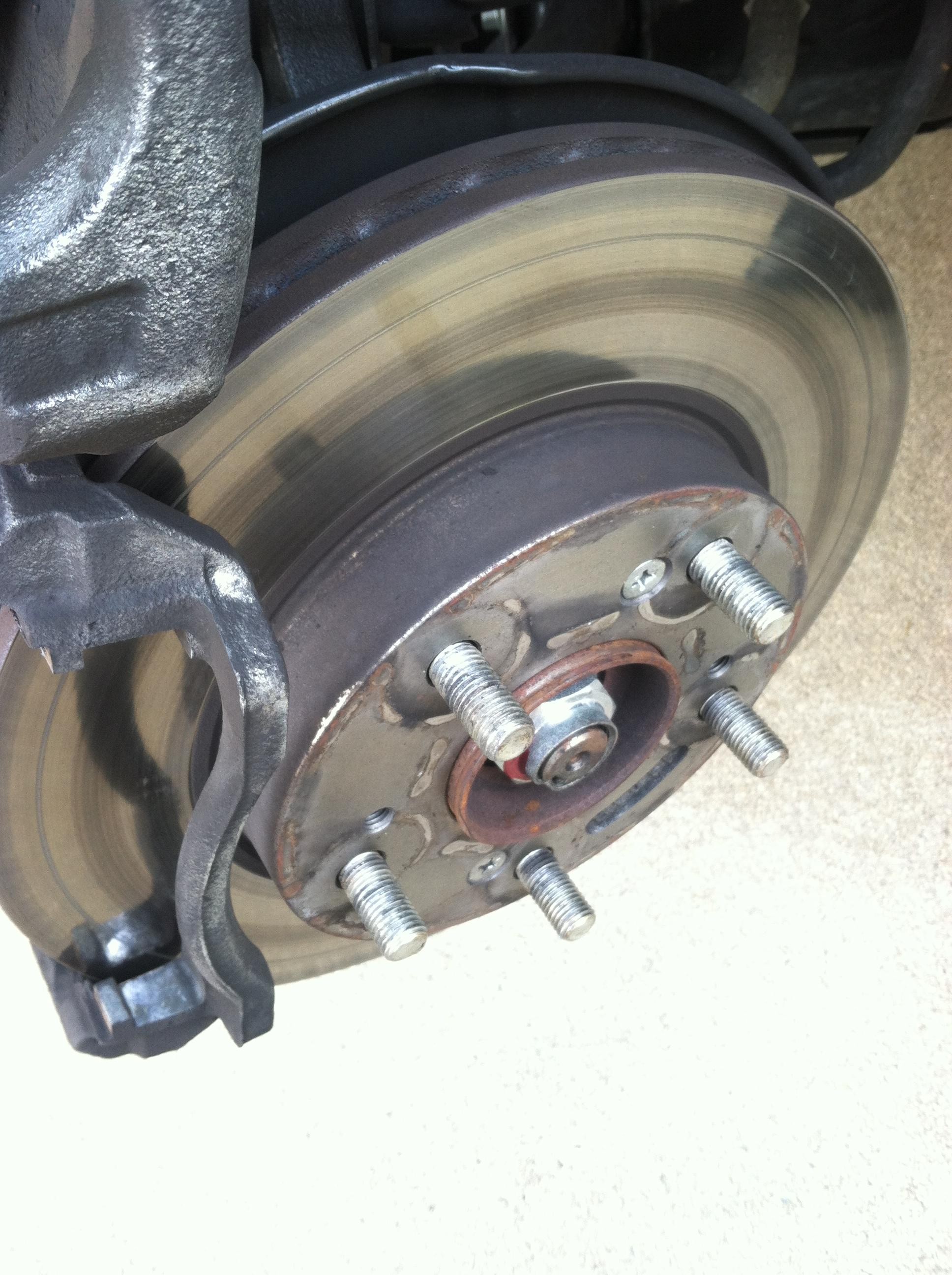It’s a sound that no driver wants to hear: the grating, unsettling noise of grinding brakes. If you’ve experienced this, you’re likely asking yourself, “Why Are My Brakes Grinding?” This article delves into the common causes of brake grinding, helping you understand the potential issues and guide you towards effective solutions. We’ll explore a personal journey of diagnosing and resolving a brake grinding problem, offering insights into troubleshooting and maintenance.
The Onset of Brake Issues
Like many car owners, I rely heavily on my vehicle for daily commuting and errands. My 2012 Honda Civic LX, while dependable, began exhibiting signs of brake trouble after around 20,000 miles. The initial symptom was a wavy brake pedal feel – an inconsistent slowing down sensation when applying the brakes. Suspecting warped rotors (or uneven pad material transfer, as explained by experts at StopTech), I decided to proactively replace both rotors and pads to ensure optimal braking performance and learn more about my car’s brake system.
I opted for EBC rotors and Ultimax2 pads, aiming for OEM-level replacement quality. During installation, I meticulously followed the original setup, checked brake fluid levels, and re-greased caliper pins and pad brackets. The immediate result was a significant improvement – the brakes felt incredibly smooth and responsive. Adhering to EBC’s break-in procedure, I drove cautiously for the first 500 miles, gradually returning to my normal driving style. The brakes continued to perform exceptionally well.
The Return of Brake Noise: An Intermittent Grind
However, after a few months of confident driving, a new and concerning issue emerged: an intermittent grinding or groaning noise when braking. The crucial word here is “intermittent.” The noise wasn’t constant; it appeared sporadically. At times, the brakes operated silently and smoothly, just as they had after the initial replacement. This inconsistency made diagnosing the problem more challenging.
To better understand the sound, I managed to record it during an evening drive. You can listen to the brake noise here (turn up your volume to hear it clearly). As you’ll notice, the noise occurs during slow stops. Further observation revealed specific patterns:
- Low-Speed Stops: The grinding noise primarily occurred during low-speed stops, not during high-speed braking or gentle slowing using engine braking.
- Intermittent Nature: Even at low speeds, the noise wasn’t always present. Sometimes, braking was perfectly silent.
- Warm Starts: The noise rarely happened after a cold start, like morning commutes. It was more likely to occur after driving for a while, especially after a short stop and restart (e.g., driving, parking for 15-30 minutes, then driving again). However, it could also appear after extended driving without stopping.
- Fluctuating Noise: The noise could come and go during a single drive. It might appear, disappear, and then reappear a few stops later. This ruled out simple surface rust, which would typically disappear after the first few brake applications.
- Subtle Squealing: Occasionally, a faint screeching or squealing sound preceded or accompanied the grinding, noticeable only with the window down and careful listening. This was distinct from the louder grinding/groaning noise.
- Consistent Performance: Despite the noise, there was no noticeable decrease in braking performance. The car still stopped effectively.
Investigating the Brake System
Driven by the need to pinpoint the cause, I decided to inspect the brakes myself. A weekend investigation involved disassembling the brake components to look for any obvious issues. Cleaning and re-greasing parts didn’t resolve the problem. My observations during this inspection included:
- Uneven Pad Wear: The brake pads showed uneven wear, with the top portions noticeably thinner than the bottom.
- Grooved Rotor: The outer side of the driver’s side rotor had a distinct groove.
A visible groove on the outer side of the brake rotor, indicating potential wear or damage.
- Matching Pad Groove: Correspondingly, the brake pad facing this rotor also had a matching groove.
A brake pad exhibiting a groove that aligns with the groove found on the rotor, suggesting contact and wear between the two components.
While the groove was evident, I questioned if it was the sole cause, as a consistent groove might lead to constant noise, not intermittent grinding. I attempted to bed in the pads again using a 60-10 x5 procedure (repeatedly slowing down from 60 mph to 10 mph with cooling intervals), as recommended by EBC. However, this also failed to eliminate the noise. I wasn’t entirely confident in my bedding-in technique, wondering if I had slowed down aggressively enough.
Seeking Professional Help and Discovering Drum Brake Adjustment
Frustrated by the persistent noise, I sought professional help from a well-reputed independent auto repair shop. The mechanic’s initial focus was on the rear brakes, specifically the drum brakes. He identified that the rear drums needed adjustment. Demonstrating the issue, he showed me how the left drum was completely seized, while the right drum was excessively loose. After adjusting the drums, he suggested driving for a couple of hundred miles to see if the grinding noise returned.
Intriguingly, the mechanic proposed that the maladjusted rear drums could be contributing to the uneven wear observed on the front brake pads. He also considered the groove on the front rotor unlikely to be the primary cause of the grinding problem.
The Solution: New Pads and Rotors
After some driving, the grinding noise unfortunately reappeared. Returning to the mechanic, we concluded that the brake pads themselves were likely the issue. They were indeed quite worn, and as previously noted, unevenly so. The intermittent nature of the problem suggested that the worn pads might sometimes make awkward contact with the rotor, causing the grinding/groaning sound at certain angles or temperatures.
To address this, I opted for new EBC Red Stuff ceramic brake pads and EBC USR slotted rotors. The shop installed these new components. Initially, the brakes were silent, a welcome relief. However, the real test would be time and mileage. It was crucial to observe if the noise would return after the new pads were fully broken in, typically after a thousand miles or so.
Understanding Why Brakes Grind: Common Causes Beyond My Experience
While my specific case pointed to worn and unevenly worn brake pads as the likely culprit, brake grinding can stem from various issues. Understanding these common causes is crucial for effective diagnosis and repair:
-
Worn Brake Pads: This is the most frequent reason for grinding brakes. As brake pads wear thin, the metal backing plate can contact the rotor, causing a harsh grinding noise. If you hear grinding, especially a metallic screech, worn pads should be your first suspicion.
-
Worn Rotors: Rotors, while more durable than pads, can also wear down over time. If rotors become too thin, or develop deep grooves and rust, they can contribute to grinding noises, especially if the pads are also worn or uneven.
-
Debris in the Brakes: Road debris like small stones, gravel, or rust particles can become lodged between the brake pad and rotor. This debris can cause scratching and grinding noises until it dislodges or is removed.
-
Glazed Brake Pads or Rotors: Overheating brakes can cause the pad material or rotor surface to become glazed or crystallized. This smooth, hardened surface reduces friction and can lead to noise, vibration, and reduced braking performance.
-
Sticking Calipers: Brake calipers are responsible for pressing the pads against the rotors. If a caliper piston or slide pin sticks, it can cause constant pressure on the rotor, leading to uneven pad wear, rotor damage, and grinding noises.
-
Low-Quality Brake Pads: Using inexpensive, low-quality brake pads can sometimes result in noise issues. These pads may use harder materials that are more prone to squealing and grinding.
-
Drum Brake Issues (Rear Brakes): As highlighted in my experience, issues with rear drum brakes, such as improper adjustment or worn components, can indirectly affect front brake wear and potentially contribute to noise, although less directly as “grinding” is usually associated with disc brakes.
Diagnosing Grinding Brakes: A Step-by-Step Approach
If you hear grinding brakes, prompt diagnosis is important for safety and preventing further damage. Here’s a step-by-step approach:
-
Listen Carefully: Pay close attention to when the grinding noise occurs. Is it during light braking, hard braking, at low speeds, or high speeds? Is it constant or intermittent? These details can provide valuable clues.
-
Visual Inspection: If you are comfortable doing so, visually inspect your brake pads and rotors. Check the pad thickness – if they look thin (less than ¼ inch of pad material), they likely need replacement. Examine the rotors for deep grooves, rust, or damage. Safety First: If you are not familiar with brake systems, it’s always best to consult a professional mechanic.
-
Consider Recent Brake Work: If you’ve recently had brake work done, consider if the noise started after the service. Improper installation or low-quality parts could be contributing factors.
-
Professional Inspection: If you are unsure about the cause or uncomfortable inspecting your brakes yourself, take your vehicle to a trusted mechanic. They can perform a thorough brake inspection, accurately diagnose the problem, and recommend the appropriate repairs.
Resolving Grinding Brakes: Solutions and Maintenance
The solution to grinding brakes depends on the underlying cause. Common remedies include:
-
Brake Pad Replacement: If worn pads are the issue, replacing them with quality pads is essential. Consider upgrading to ceramic pads for quieter operation and longer lifespan.
-
Rotor Resurfacing or Replacement: If rotors are worn, grooved, or damaged, they may need to be resurfaced (if they are still thick enough) or replaced. In many cases, rotor replacement is recommended for optimal braking performance, especially when replacing pads.
-
Caliper Service or Replacement: If a sticking caliper is suspected, the caliper may need to be serviced (cleaned, lubricated, and pistons checked) or replaced.
-
Drum Brake Adjustment or Repair: If rear drum brakes are contributing to the issue, adjustment, cleaning, or component replacement might be necessary.
-
Debris Removal: Sometimes, simply removing debris from the brake area can resolve the noise. However, if debris is a recurring problem, it’s worth investigating if there’s an underlying issue, like a damaged brake shield.
-
Regular Brake Maintenance: Preventative maintenance is key to avoiding brake problems. Regular brake inspections, pad replacement before they become critically thin, and periodic brake fluid flushes can extend the life of your brake system and ensure safe, quiet operation.
Conclusion: Addressing Brake Grinding for Safety and Peace of Mind
Grinding brakes are more than just an irritating noise; they are a warning sign that something is wrong with your vehicle’s braking system. Ignoring this sound can lead to decreased braking efficiency, rotor damage, and potentially unsafe driving conditions. Whether it’s worn pads, rotor issues, or other underlying problems, addressing grinding brakes promptly is crucial for your safety and the longevity of your vehicle. Don’t hesitate to investigate the issue yourself or seek professional help to diagnose and resolve the problem, ensuring smooth, silent, and reliable braking performance.
Disclaimer: This article is for informational purposes only and should not be considered professional automotive advice. Always consult a qualified mechanic for diagnosis and repair of brake issues.

